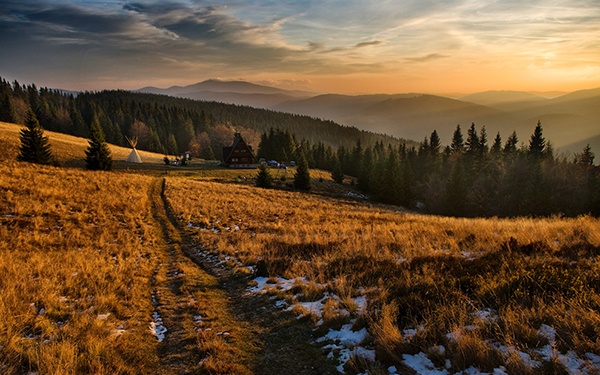Are you considering moving to Poland from the UK?
For many Brits, Poland remains a bit of an enigma.
Not your typical tourist destination, Poland is a nation imbued with history and tradition going back to the 10th century. It is of course a country famous for being at the heart of the WWII conflict, and there are a wealth of historic sites and museums to discover which attest to that, but Poland’s story has so much more to tell.
From Medieval castles on rugged mountains through to energetic and fast developing cosmopolitan cities, to idyllic natural landscapes of rolling meadows, tranquil lakes, and deep forest, Poland has an enormous amount for expats to discover and enjoy.
Here’s our guide to moving to and living in Poland from the UK…
Contents
Poland Visa Requirements for Brits
Visiting
British passport holders do not currently need a tourist visa to visit Poland for stays of up to 90 days.
It’s not certain what will happen after Brexit, but it is currently thought that British Citizens would be able to visit countries in the Schengen area or elsewhere in the EU for up to 90 days in any 180-day period without a visa.
Working
As things stand UK citizens can legally work in Poland without a work permit.
If the UK leaves the EU with a deal, UK nationals arriving in Poland before 31 December 2020 will be able to stay and register under the current rules. Once the UK is no longer part of the European Union however, Brits will most probably need to apply for a residence permit and work permit in order to be employed and live there.
Work permits are granted on the basis that you already have a Polish employer lined up who will vouch for you and apply for the permit on your behalf.
If you decide to leave your company you lose your work permit and similarly, if you want to get a new job your new employer will have to go through the process of applying for a new work permit for you.
A residence permit can be applied for in tandem with the work permit as long as you have the promise of an employment contract with a Polish employer.
Residence permits grant a stay that lasts from 3 months up to 1 year, after which time it is renewable for an additional year.
Permanent Residency
There are two main routes for obtaining permanent residency in Poland.
The first is the settlement permit which is granted to expats who has been married to a Polish national for a minimum of 3 years.
The second and most usual option is the EC-long term residence permit which is granted to those who have been already resident in Poland for at least 5 years and who has had stable and regular income and is as well covered by health insurance.
Way of Life in Poland
Lifestyle
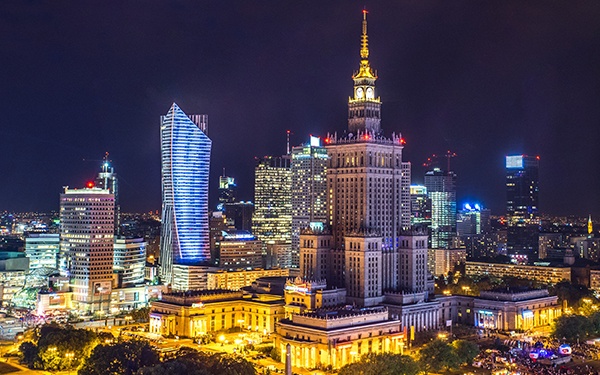
Poland’s many traditions and customs have been shaped by Latin and Byzantine influences, and also its former European occupiers.
The culture is generally welcoming, and the Polish people are warm and hospitable and have a strong sense of community.
Food plays a major part in Polish social and family life, and typical Polish cuisine is hearty and wholesome and based around local ingredients which combine to create simple dishes – often meat or fish based – featuring beetroot, onion, pork, cabbage, potatoes, or mushrooms.
Popular traditional dishes include bigos (sauteed sauerkraut, sausage, mushrooms, tomatoes, and onions) borscht (beetroot soup) and pierogi — small dumplings filled with vegetables or meat. Sweet dishes including cream cakes, strudel, and ice cream, also have an important place in the Polish menu.
The vast majority of people live in urban areas, and it is common for two or three generations of the same family to share a house. In the countryside people usually grow their own food and live a fairly simple lifestyle.
Life in Poland is generally laid back and things tend to move at a pleasantly slow pace – particularly in rural areas.
Polish people love music and to dance, and traditional Polish folk music is still very popular, with many folk festivals taking place throughout the year, as well as contemporary music festivals.
In the big cities the nightlife is vibrant, and there are a wealth of cultural events, concerts, film and music festivals, and more to enjoy throughout the year.
Getting Around
There are three main forms of transport in Poland: train, bus, and aeroplane.
The country’s rail network is well developed, far reaching, and reasonably priced. The main railway operator in Poland is Polish State Railways (PKP), but there are also numerous private operators, each offering different standards of service and varying ticket prices. Travelling by train is a good option for long distance travel within Poland, but be aware that many smaller towns and cities are not serviced by the rail network and can only be reached by bus or car.
The Polish bus network is more extensive than that of the rail services, albeit slower, and travelling by bus can be both cheap and convenient for shorter — sometimes longer — distances.
Privately owned minibuses tend to cover short local routes, particularly in rural areas. FlixBus, also known as Polski Bus is the main nationwide coach operator, and runs services between major cities and towns using modern coaches with free wi-fi.
Tickets for these services and intercity services can be bought online, whereas local bus service tickets must be bought at the bus station or directly from the bus driver.
Air travel is the fastest and most comfortable option for travelling long distances, and there are regular flights between the major cities.
The main Polish air carrier is Polish Airlines (LOT), which offers both international and domestic flights. In the cities there are good public transport infrastructures in place.
All cities have an efficient local bus service, and some also have trams and trolleybuses. As the nation’s capital Warsaw benefits from a modern metro system.
Taxis are another good way to get around Polish cities. Fares are generally affordable, and taxis can be ordered in advance or flagged down on the street.
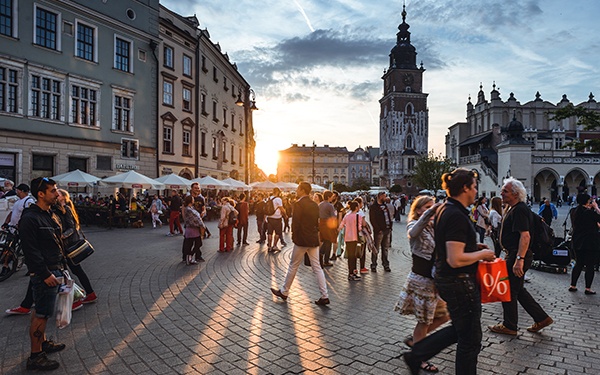
Driving in Poland
Driving in Poland is reasonably straightforward and a great way to visit more out of the way areas, however be aware that Polish drivers are often reckless, driving too fast and overtaking dangerously.
Road quality varies wildly depending on location, with rural roads often being of questionable quality.
There are currently only a few motorways, although the motorway network is constantly being upgraded. Expect to pay tolls on motorways, and experience delays due to ongoing roadworks and overcrowding.
You’ll need to be over 21 to hire a car in Poland — 23 in some cases — and have held your license for at least one year, and be the holder of either an EU or international driving licence.
Weather in Poland
Autumn is Poland’s most glorious season, especially the month of October when the trees are at the peak of their spectacular colour displays.
At this time of year the weather can be unpredictable, changing quickly between bright sunshine, fog, and rain, but temperatures remain comfortable.
Winter on the other hand brings very cold weather — sometimes with temperatures as low as a bitter -20°C in some areas — although the average winter temperature is around -6°C. There is also plenty of heavy snowfall during this period which although very pretty, can be inconvenient.
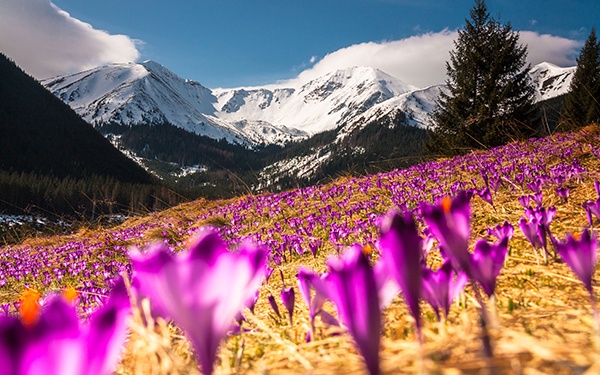
Things start to warm up in March with the spring, and the transition from late spring to summer is a very pleasant time of year.
Polish summers are very warm, with plenty of sun and average temperatures of around 20°C to 25°C and highs of around 30°C.
Cost of Living in Poland
Lifestyle
Compared to most other European destinations, Poland is a cheap place to live.
However as with any country, some areas are more expensive than others, with Warsaw, Krakow, and Wroclaw commanding the highest prices.
It is also worth taking into account that incomes are low, with average annual salaries only around 25% of those in other EU countries at roughly 4900 PLN a month before tax, or about £1020. Groceries are around 50% less expensive than in the UK, and alcohol costs very little.
Entertainments and eating out are also very affordable. A three course meal for two in a decent restaurant costs on average 100 PLN, which is the equivalent of about £20, and a cinema ticket costs around 20 PLN which equates to £4.
Public transport is inexpensive, and even a monthly pass will only set you back around 100 PLN.
It is important to factor in the cost for utilities when working out any monthly budget. The average price for electricity bills, heating, water and refuse collection for a medium size apartment is roughly 620 PLN, or £130, depending on location.
Take a look at this video on the cost of living for two expats in Krakow:
Rent
Rental costs are by far the biggest monthly expense when living in Poland, but relative to the UK accommodation is cheap — even in major cities.
Warsaw is particularly expensive by Polish standards, with the average price for a medium sized apartment of 38-60 m2 costing as much as 2800 PLN per month, which equates to about £580.
In any city, the closer the accommodation is to the main square, the more it will cost. Accommodation in smaller cities and towns and rural areas is much cheaper.
Healthcare
Poland has it’s own version of the NHS in the UK — the state financed National Health Fund (NFZ) — for which contributions are automatically deducted from each person’s monthly wage.
EU citizens are entitled to free medical care under the NFZ on presentation of a European Health Insurance Card, but non EU citizens can only benefit if they are employed in Poland, a close family member of someone who is already insured with the NFZ, or if unemployed, registered at the employment office and be actively seeking work.
The standard of public medical care in Poland is satisfactory, but varies depending on location, with the best facilities and medical staff being located in the major cities.
Many Polish citizens opt to take out additional private healthcare policies to benefit from a higher standard of care and avoid long waiting lists for treatment, and expats are advised to do the same.
Private health insurance in Poland is relatively affordable, and is well worth it in the event of any serious illness or long term treatment.
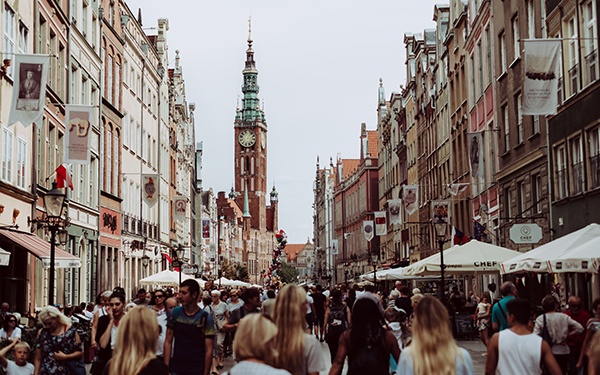
Schooling
The Polish public education system is free and generally of a reasonable standard, but as lessons are taught exclusively in Polish most expats prefer to enrol their children in an international school.
The majority of international schools offer a high standard of education and are based in Warsaw and Krakow, and many follow the English national curriculum.
Annual tuition for an international school in Poland can range anywhere from between the equivalent of £10000 to £30000.
Popular Areas for Brits
Krakow
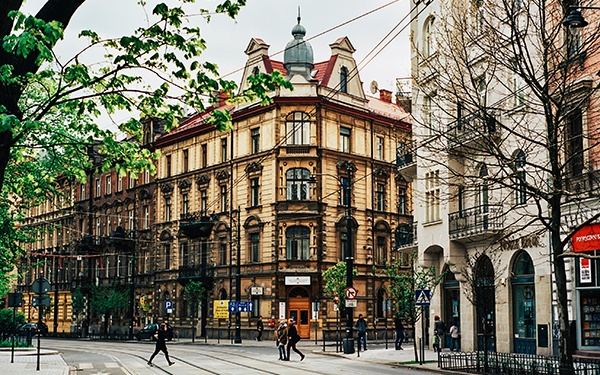
Poland’s old capital Krakow is packed full of historical attractions, museums and galleries, bars, restaurants and shops tucked away along its winding narrow streets.
Krakow boasts a wealth of incredible architecture, including Gothic churches, medieval market squares, and royal palaces and cathedrals.
It is also perhaps Poland’s most multicultural city, and welcomes foreigners from all over the world. Krakow is a major economic, cultural, artistic and academic hub, and the job market here offers up some good opportunities for Brits.
A lively student population keeps the atmosphere youthful and fun, and there is an extensive annual list of festivals and events celebrating music, food, the arts, film, and more.
Warsaw
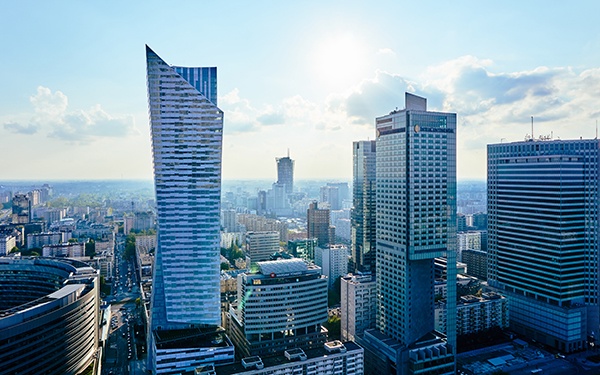
The nation’s capital city was almost entirely destroyed during the second World War, but thanks to the unbreakable Polish spirit has since been completely rebuilt to create a contemporary city astride the majestic Vistula river.
It’s complete with lush green spaces, renovated historical buildings from the baroque, Gothic, neoclassical and Renaissance periods in the Old Town, plus an abundance of theatres, museums, galleries, cool bars, and cutting edge restaurants.
If you like to live it up you’ll love Warsaw nightlife as the city boasts some of the best clubs in the country.
The job market here is attractive for British expats, as there are many international businesses seeking English speaking employees.
Lodz
Lodz is the third largest city in Poland originally founded on the wealth of its successful textile industry, only to fall into decline after the war.
These days Lodz has been rejuvenated to dramatically reinvent itself as a thoroughly cosmopolitan and contemporary city with elegant architecture, industrial chic, excellent galleries and museums, boutiques, edgy bars and restaurants, and a vibrant arts scene.
Gdansk
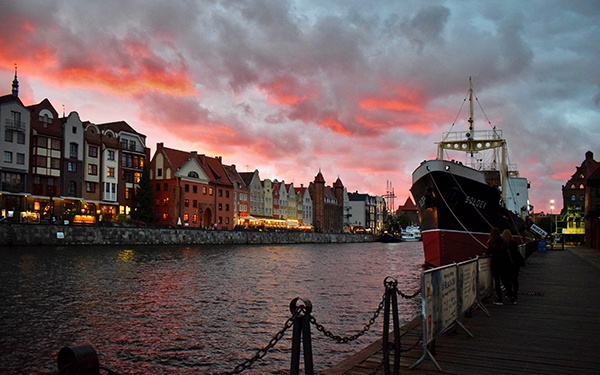
The thousand year old maritime city of Gdansk sits proudly on the shores of the Baltic sea in the north of Poland.
Gdansk is a coastal gem with a unique style all of its own, shaped by centuries of trade with foreign merchants.
From its elegant harbour to its quirky bars and cafés the city is bursting with character. Some of the best museums in Poland can be found here, and the seafood is second to none.
Poznan
Poznan is a city overflowing with entrepreneurial spirit, and is a centre of business and trade as well as a dynamic student city.
Alive with energy, Poznan is a city ready to party, with countless bars, clubs and restaurants dotted along the streets lined with magnificent and colourful buildings, and possesses a somewhat bohemian vibe.
It also has one of the lowest unemployment rates in Poland, and is a great place for expats to look for work.
Torun
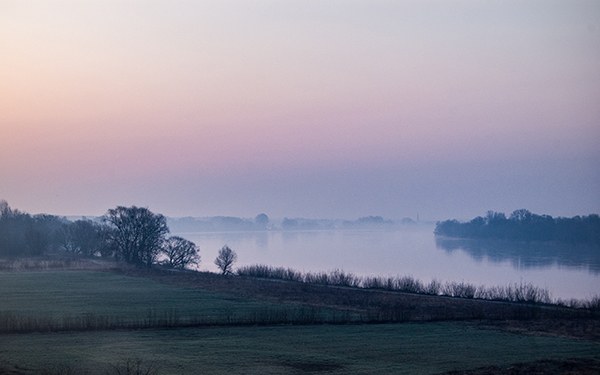
Designated a UNESCO World Heritage site, Torun is one of the few places in Poland not devastated during WWII, and is blessed with incredible medieval sites and architecture and a superb walled Gothic Old Town.
Enduringly charming, Torun is a peaceful city that attracts surprisingly few tourists, and is a wonderful place for expats to call home.
Wroclaw
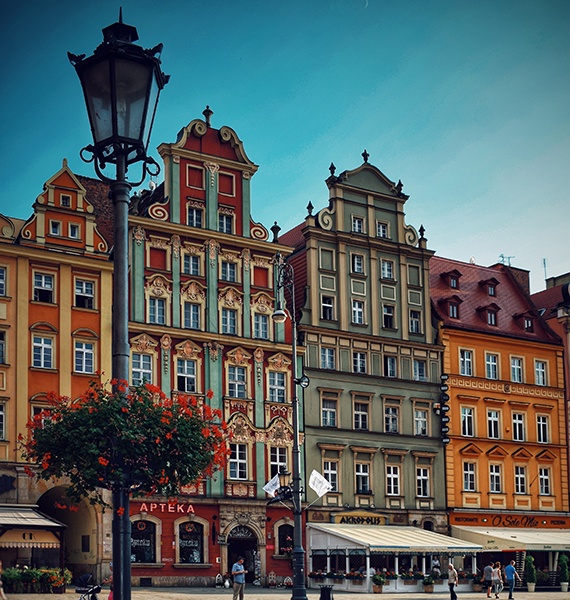
Considered by many to be Poland’s most magnificent city, Wroclaw is favoured with an idyllic location centred around multiple rivers and islands, and boasts nearly 200 bridges, and because of this it is often referred to as the Venice of the North.
The compact medieval Old Town is filled with quaint cobbled streets and pretty, sugar almond coloured buildings.
The bar scene here is thriving and the nightlife positively electrifying. Wroclaw is also a major industrial, commercial, cultural, and educational centre, and has a large student population and a vibrant calendar of festivals and events.
Jobs in Poland for British Expats
Poland has seen good recent economic growth, which in turn has opened up new employment possibilities for British expats.
While Poland’s main industries such as banking, construction, iron and steel, agriculture, and machine manufacturing and food processing are possible sectors where foreigners may find work, jobs in these industries are given to the native workforce as a priority.

Brits are more like to find work in the new, up and coming sectors such as IT, finance, logistics, business management, marketing, and tourism.
Learning the Polish language will greatly increase your chances of getting a job, as although many younger people speak English the vast majority speak Polish.
Teaching English is a popular choice of employment for UK expats, as native English speakers are in high demand and teaching positions usually command good levels of pay.
Are you thinking of a move to Poland from the UK?


